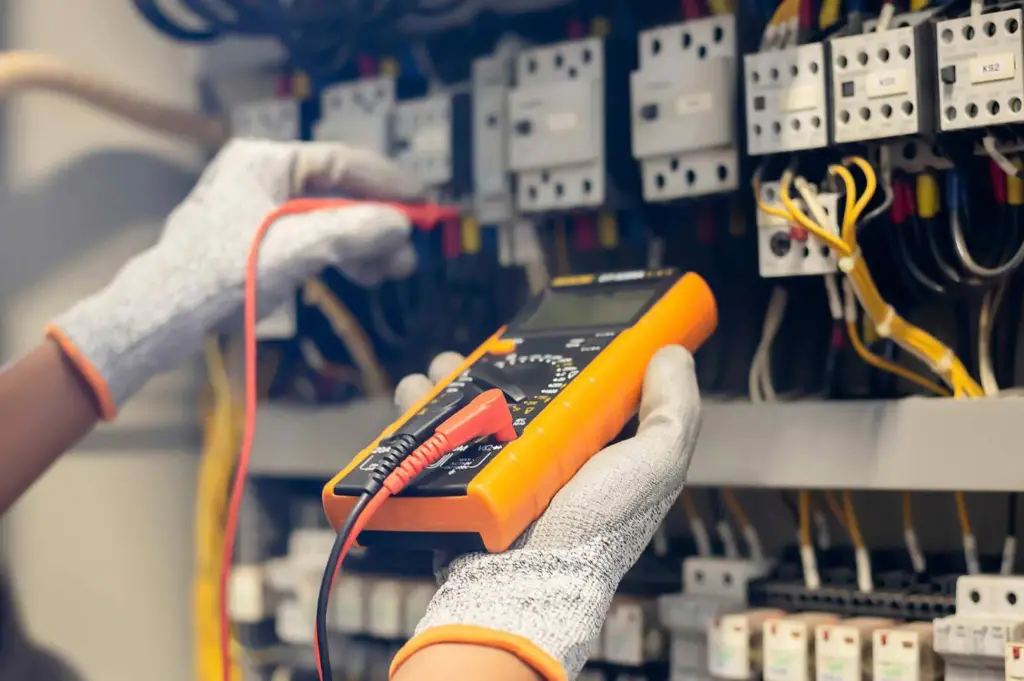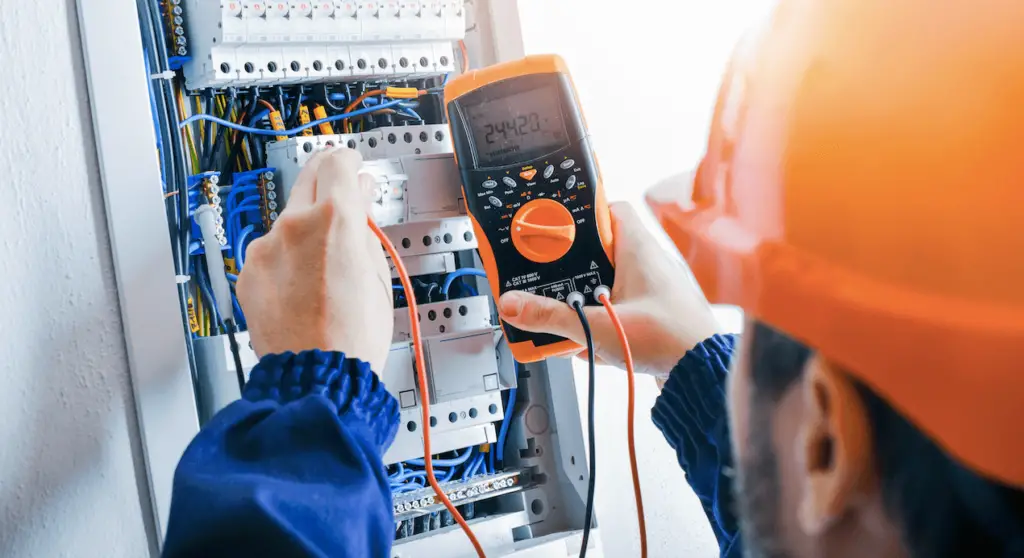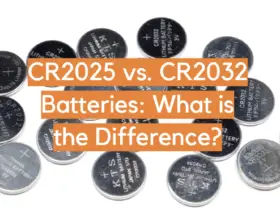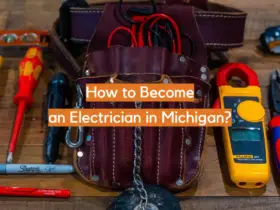Do you want to take the next step in your career and become a licensed electrician in Georgia? If so, you’re in the right place! Becoming an electrician can open up many doors for opportunities; from being able to provide electrical services safely and legally for customers on commercial job sites or working on residential service calls. To reach that goal of becoming an electrician, there are steps that need to be taken, paperwork that needs to be filled out and tests that must be passed. This blog post will cover what it takes to become an electrician in the state of Georgia – including licensing requirements, training programs offered and apprentice information – giving people like you all the resources they need to achieve their dreams as a successful professional in this rewarding industry.
Steps to Become an Electrician in Georgia
1. Meet the Basic Qualifications
In order to become an electrician in Georgia, applicants need to fulfill certain requirements.
- Be at least 18 years old
- To apply, you must have either a high school diploma or a G.

2. Complete the Required Education and Training Program
In order to become a licensed electrician in Georgia, aspiring professionals must complete an approved education program and training.
These programs offer instruction on electrical theory, safety practices, codes and regulations, as well as hands-on technical skills. Most programs last from one to two years or more depending on the type of program selected. After successfully completing these courses, applicants are eligible to take the exam for their chosen license type.
3. Get an Apprenticeship Program
Many aspiring electricians choose to enter an apprenticeship program in order to gain the experience and training necessary to become a licensed electrician. Apprenticeships are sponsored by local unions or contractors and can last from two to five years, depending on the type of trade. During this period, apprentices learn through a combination of classroom instruction and practical experience by working alongside a skilled electrician. [1]
4. Pass the Examination and Earn a License
Once you are approved to take the examination, you will need to apply and pay the registration fees. The licensing exam is administered by PSI Exams and requires applicants to answer a series of multiple-choice questions. Applicants must score at least 70% on the exam in order to pass and be eligible for an electrician’s license in Georgia. After passing the exam, applicants must submit their applications along with the required documentation such as proof of experience, criminal background check results (if applicable) and fingerprints. With all documents submitted, applicants can expect their licenses to arrive within four weeks.
Other Requirements For Becoming An Electrician In Georgia
- Applicants must complete a state and federal background check
- Electricians are required to obtain a business license
- Applicants may need to undergo drug testing prior to licensure
- All electricians must carry liability insurance in order to legally work in the state of Georgia.
With the correct qualifications and preparation, you can easily become an electrician in Georgia!

Career Advancement Opportunities for Electricians in Georgia
For electricians in Georgia looking to advance their career, there are many possibilities for advancement. The most common paths for advancing an electrician’s career include pursuing a higher degree, becoming certified in specialty areas, and taking on more responsibility or working as a supervisor.
Electricians who wish to pursue a higher degree should consider earning an Associate of Applied Science (AAS) or Bachelor of Science (BS) degree from a program accredited by the Accreditation Board for Engineering and Technology (ABET). This will open doors to advanced positions with better pay. Furthering your education can also lead to certification through organizations like the National Electrical Contractors Association (NECA).
Electricians who wish to specialize in one area can become certified in a particular type of electrical work.
For instance, electricians can become certified in controls and automation, residential wiring, industrial maintenance and repair or renewable energy. This certification will help you stand out from other aspiring electricians and give you an edge when applying for jobs.
Electricians who are looking to take on more responsibility or work as a supervisor have several options available to them. They can pursue an apprenticeship program that provides hands-on training under the guidance of experienced professional electricians.
Alternatively, they may be eligible for management positions through their employer or by completing a certificate program focused on supervision and leadership skills. Finally, those looking for supervisory or management positions could consider taking courses in business administration and accounting which could position them for higher-level supervisory or managerial roles. [2]

No matter which career path an electrician in Georgia chooses, there are numerous opportunities available to advance their career and get ahead. With the right education and experience, electricians can become certified specialists, take on more responsibility, or even pursue a management role in this rewarding industry. By taking advantage of these avenues of advancement, electricians can ensure they stay competitive and secure long-term success in their field.
What Makes a Successful Electrician in Georgia?
To be a successful electrician in Georgia, you must possess several qualities. First and foremost, electricians must have strong problem-solving and troubleshooting skills. Electricians are often called upon to analyze complex electrical systems and figure out how to best repair them. They must also have excellent knowledge of the National Electrical Code (NEC), as this is a crucial document that dictates safety standards for any installations or repairs. Additionally, electricians need to stay up-to-date with changes in technology, most notably advancements in digital controls, smart home automation systems, and renewable energy sources.
Good communication skills are essential for any trade professional, especially electricians. Being able to clearly explain technical information to customers or other workers is essential to providing effective customer service. Furthermore, electricians must have excellent hand-eye coordination and manual dexterity to work with the small wires and intricate components of electrical systems. On top of that, they need physical strength and stamina to work in uncomfortable positions for long stretches of time.

Lastly, electricians must be able to adhere to safety protocols and follow instructions precisely.
Overall, the combination of technical knowledge, problem-solving skills, physical strength, and communication acumen makes a successful electrician in Georgia. If you are looking to become an electrician in this state, make sure you possess these qualities before pursuing your career goals! [3]
Salary Factors
The salary for electricians in Georgia can vary significantly depending on experience, location, and credentials.
Entry-level electricians typically make an hourly rate of $11 to $15 per hour. More experienced electricians generally earn wages between $17 to $25 per hour. Electricians who hold national certifications or state licenses tend to receive higher pay rates than non-certified electricians. In addition, salaries are often higher in urban areas and larger cities due to cost of living and the greater demand for qualified electrical workers. A master certified electrician with a decade of experience may see annual earnings as high as $100,000 or more depending on their specialization and employment situation.
In addition to standard wages, many employers also offer bonuses, commission pay, and benefits packages. Common forms of compensation include overtime pay, health plans, vacation and sick leave time, educational reimbursement programs, and 401(k) retirement savings plans. Such benefits can significantly increase the total salary for an electrician in Georgia.
It is important to note that salaries for electricians in Georgia are subject to federal taxes as well as state taxes. The exact amount of taxation depends on a variety of factors such as the individual’s filing status and taxable income. It is recommended that all individuals discuss their tax liability with a qualified accountant or certified financial advisor for more accurate information about how their wages will be taxed.
Electricians in Georgia are members of the International Brotherhood of Electrical Workers (IBEW).

Overall, salaries for electricians in Georgia are competitive when compared to those of other construction or repair professionals. With education, experience, certifications, and membership in the IBEW, electricians have strong earning potentials that allow them to enjoy comfortable lifestyles while providing excellent service to their customers and employers. [4]
Benefits of Working as an Electrician in Georgia
Georgia is one of the best places to be an electrician. The state offers excellent wages, career opportunities, and benefits for electricians. Here are some of the reasons why you should choose a career as an electrician in Georgia:
- Wages: Electricians in Georgia make great money. According to PayScale, the average salary for an electrician in Georgia is over $47,000 per year. That’s much higher than the national median income of around $35,000 per year.
- Job Security: As electricity becomes more essential in our lives, there will always be a demand for qualified professionals who can install and maintain electrical systems. This means that job security is high for electricians in Georgia who are up to date on their certifications and skills.
- Diverse Opportunities: Electricians in Georgia have the opportunity to work in a variety of settings. From installing residential wiring to commercial systems, electricians can find work in many places throughout the state.
- Career Advancement: With experience, electricians can advance their careers into supervisory or managerial roles. This gives them more responsibilities and higher pay scales. In addition, they may be able to open their own business or specialize in specific types of electrical work like solar installation or industrial repair.
Working as an electrician in Georgia comes with a lot of benefits that make it an attractive career choice for those looking for a long-term job with good wages and job security. If you are interested in becoming an electrician in Georgia, make sure to research the requirements and regulations for obtaining a license and start planning your career today!
How Long Is Electrician School in Georgia?
Electrician school in Georgia varies by the program, but a full-time student can expect to complete their training in roughly two years. This includes completing all of the required classes and hands-on learning opportunities.
During this time, students will learn about electricity safety, electrical codes, wiring basics, and many other topics that are essential for any electrician. After they have completed all coursework, students must pass a comprehensive exam administered by their state’s licensing board before they can begin working as an electrician.

It is also important to note that some states require a certain amount of on-the-job experience before granting licensure. In Georgia, these requirements vary depending on the type of license an individual is seeking. For example, journeymen electricians are required to have four years of experience working as an apprentice before they can become fully licensed. However, those seeking a residential license may only need two years of on-the-job training.
In addition to completing their formal education and gaining the necessary experience, students must also check with their state’s licensing board for any additional requirements that will need to be met in order to become a licensed electrician in Georgia. This may include taking additional exams or completing continuing education courses throughout your career. Licensed electricians must fulfill these requirements in order to maintain their license and stay up-to-date with current safety standards and regulations. [5]
By following these steps, individuals who are interested in becoming an electrician in Georgia can begin the process of getting their license. With the right training, experience, and dedication, anyone can become a licensed electrician in this state.
Can You Do Electrical Work Without A License In Georgia?
No, you cannot do electrical work without a license in Georgia. According to Title 43 of the Official Code of Georgia Annotated, only certified electricians may perform electrical installations and repairs in the state. This means that anyone who is not licensed or registered as an electrician must hire one to carry out any type of electrical work.
Additionally, electricians are prohibited from performing unauthorized work under penalty of law. Electricians must also adhere to all local laws and building codes when completing any kind of electrical project. Failure to follow these regulations could result in hefty fines and even jail time for those found guilty.
Therefore, it is essential for electricians to obtain the necessary licensing credentials before embarking on any electrical job in Georgia. [6]

FAQ
How long does it take to get an electrical license in Georgia?
The licensing process for electricians in Georgia takes approximately two to four weeks. Applicants must first complete an apprenticeship program before they can qualify for a license. The program consists of classroom and field training, which can take between two to five years, depending on the specific requirements of the state. After completing the apprenticeship and passing all tests required by the Electrical Licensing Board, applicants will then be able to apply for their electrical license from the board.
What type of work does an electrician do?
Electricians are responsible for installing, repairing, and maintaining electrical wiring systems and equipment such as circuit breakers, transformers, motors, sockets, fixtures and other devices that carry electricity throughout homes and businesses. They may also be responsible for inspecting and testing these systems to ensure their safety.
Additionally, electricians may install wiring in new construction projects and expand or upgrade existing electrical systems.
What are the educational requirements for an electrician in Georgia?
Electricians must complete high school or obtain a GED before starting an apprenticeship program. Apprenticeships typically require applicants to pass tests related to math and physics before they can enroll. Once enrolled, apprentices typically receive both classroom instruction and hands-on training in areas such as installation, repair and maintenance of electrical systems. Upon completion of a successful apprenticeship program, applicants must then take the Georgia Electrical Licensing Test in order to receive their license from the Electrical Licensing Board.
Are there any special certifications required to become an electrician in Georgia?
In addition to the basic license requirements, there are several specialty certifications that can be obtained via trade schools or approved apprenticeship programs. These include journeyman certification, residential wiring certification, commercial wiring certification and high voltage electrical systems certification. Additionally, electricians may pursue the Master Electrician Certificate which is the highest level of certification offered in Georgia.
What is the application process for obtaining an electrical license in Georgia?
The application process for obtaining an electrical license in Georgia begins with completing a recognized apprenticeship program.
Applicants must then pass all tests administered by the Electrical Licensing Board before they can apply for their license. After submitting all necessary paperwork and fees, applicants will receive their license certificate.
Are there restrictions on the types of projects that electricians in Georgia can take on?
In general, electricians in Georgia are allowed to work on any projects related to electrical systems and equipment, including new construction, upgrades, repairs and maintenance. However, certain high voltage projects may require additional certifications or training. Additionally, some areas may have additional regulations or restrictions that apply to electricians working within their jurisdiction.
What is the average salary for an electrician in Georgia?
The average salary for an electrician in Georgia ranges from $37,000 to $52,000 per year depending on experience and location.
Electricians with more experience and certifications may be able to command higher salaries than those without such credentials. Additionally, electricians working in urban areas may be able to find higher-paying jobs than those working in rural areas.
What benefits are available to electricians in Georgia?
Electricians in Georgia are typically eligible for health insurance, vacation and sick leave pay, 401(k) plans and other retirement benefits. Some employers may also offer additional perks such as discounts on tools or equipment.
Additionally, many companies provide continuing education courses to help their employees stay up-to-date on the latest electrical technologies and techniques.
How do I get my electrical license in GA?
In order to work as an electrician in the state of Georgia, you must obtain a license from the Georgia State Board of Examiners. Before applying, make sure you meet the following eligibility requirements:
- You must have completed a state-approved apprenticeship program or have at least four years of experience working in the electrical trade under a qualified journeyman electrician.
- You must pass both the Business and Law exam and the Electrical Exam administered by PSI Services LLC (your exams will be graded separately).
- Submit your application with all applicable fees and documents to the State Board of Examiners along with proof of completion for your approved apprenticeship program or four years’ worth of experience.
- Once your application has been reviewed and approved, you will receive an original license certificate from the Board that confirms you as a licensed electrician in the state of Georgia.
- You must renew your license every two years and pay the appropriate renewal fee to remain active as a licensed electrician.
- Depending on the type of electrical work you intend to perform, additional licensing may be required (e.g., low voltage or residential wiring).
Are electricians in demand in Georgia?
Yes! Georgia is home to many vibrant industries and organizations, from manufacturing hubs to tech start-ups. All of these areas require an experienced workforce that can handle complex electrical systems. Electricians in Georgia are in demand and can easily find employment with many different companies or organizations.
Can I do my own electrical work in Georgia?
No. In Georgia, it is illegal for anyone other than a licensed electrician to work on electrical wiring and systems. Any person or company who performs electrical work without being properly registered with the state may face significant fines or even criminal charges. In order to become an electrician in Georgia, you must first complete an approved apprenticeship program or training program and apply for licensure through the Georgia Construction Industry Licensing Board (GCILB). Upon approval of your application, you will be issued a license that allows you to perform all types of electrical work in the state of Georgia. You may also need to take continuing education courses in order to maintain your license. If you are considering becoming an electrician in Georgia, make sure to research the requirements thoroughly and follow all of the necessary steps.
What is the top end salary for an electrician?
In Georgia, electricians can earn an average salary of between $37,000 and $77,000 per year. The salary range depends on the area of specialization and experience level. Electricians in major metropolitan areas such as Atlanta, Savannah, and Macon tend to earn higher salaries than those working in smaller cities or rural areas. A highly experienced master electrician with more than 10 years of experience could make upwards of $90,000 annually. In addition to salary potentials, many employers offer benefits like health insurance, paid time off and retirement plans that can significantly enhance an electrician’s total compensation package. It is important to understand that there are many factors that play a role in determining an electrician’s salary. The size and wealth of the company, location of job, industry sector, and availability of qualified electricians all influence the salaries that electricians can expect to receive in Georgia.
Useful Video: How To Become an Electrical Contractor in Georgia License Requirements and Trade Schools
Conclusion
Becoming an electrician in Georgia is a rewarding career choice that can offer competitive wages and job stability. To become an electrician, you will need to complete extensive training and obtain several licenses from the state. It’s important to understand the different requirements, based on your career goals, so you can ensure you meet all necessary qualifications. With dedication and hard work, obtaining a license as a journeyman or master electrician will open up doors of opportunity for those desiring a successful electrical career in Georgia.
Good luck!
References
- https://www.gyfted.me/how-to-become/certified-electrician/georgia-ga
- https://www.servicetitan.com/licensing/electrician/georgia
- https://iecatlantaga.org/training/electrical-license/
- https://asktheelectricalguy.com/georgia-electrician-guide/
- https://www.electricianschooledu.org/georgia/
- https://www.athomeprep.com/how-to-become-an-electrician-in-georgia/











Leave a Reply